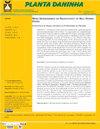利用除草剂进行淡季管理,以减少水稻生产系统中杂草的侵害
IF 0.8
Q3 Agricultural and Biological Sciences
引用次数: 1
摘要
背景:杂草管理是水稻生产中的一个挑战,主要是由于抗除草剂种群的扩散。目的:评价淡季化学除草对减少水播稻和钻孔稻中杂草和其他杂草种类的效果。方法:采用随机区组设计,在平田中进行水播和钻孔水稻试验。水种子系统处理采用分块设计。在小区中评估了两种非季节性水管理(有或没有连续洪水),在小区中评估了9种除草剂处理(氯马酮0.72和1.08 kg a.i. ha-1,恶二唑1.00和1.50 kg a.i. ha-1,氟氧芬0.312和0.48 kg a.i. ha-1, s-甲草胺1.44 kg a.i. ha-1,氟恶嗪0.075 kg a.i. ha-1)。在钻孔水稻试验中,处理按双因子因子组织。A因子为9种除草剂处理(水种试验中施用相同的除草剂和用量),B因子为2次施肥(播前73和43 d)。结果:淡季管理仅在使用预发芽种子的水稻系统上有效地减少杂草水稻的侵害。在本实验中,氟恶嗪是一种有效的替代除草剂,但其选择性还有待进一步研究。在旱种系统中,在水稻播种之前,在淡季喷洒除草剂可以减少稗草的侵害。结论:淡季管理能有效减少水播系统杂草稻和巨箭害,以及播系统稗子害。本文章由计算机程序翻译,如有差异,请以英文原文为准。
Off-season management with herbicides as an alternative to reduce weed infestation in paddy rice production systems
Background: Weed management is a challenge in paddy rice production, mainly due to the dispersal of a population resistant to herbicides. Objective: To assess the efficacy of chemical weed control in the offseason to reduce weedy rice and other species in water-seeded or drilled rice. Methods: Two experiments were carried out in a flat field to water-seeded or drilled rice, in randomized block design. The water-seeded system treatments were organized in a split-plot design. In the plot were evaluated two water management in the off-season (with or without continuous flooding), and in the subplot nine herbicides-treatments were evaluated (Check, clomazone at 0.72 and 1.08 kg a.i. ha-1, oxadiazon at 1.00 and 1.50 kg a.i. ha-1, oxyfluorfen at 0.312 and 0.48 kg a.i. ha-1, S-metolachlor at 1.44 kg a.i. ha-1, and flumioxazin a 0.075 kg a.i. ha-1). In the drilled rice experiment, the treatments were organized in a two-factor factorial. The factor A was nine herbicides treatments (the same herbicide and rates applied in water-seeded experiment) and the factor B was two application time (73 and 43 days before of rice-sowing). Results: Off-season management was efficient to reduce weedy rice infestation only on the paddy rice system using the pre-germinated seeds. In this assay, flumioxazin was an efficient alternative to giant arrowhead control, however the selectivity of this herbicide treatment needs to be studied. In dry-seeded system, herbicide sprayed in off-season reduced barnyardgrass infestation until the paddy rice sowing. Conclusions: The off-season management was efficient to reduce weedy rice and giant arrowhead infestation in water-seeded system, and barnyardgrass infestation in drill-seeded system.
求助全文
通过发布文献求助,成功后即可免费获取论文全文。
去求助
来源期刊

Planta Daninha
Agricultural and Biological Sciences-Plant Science
自引率
0.00%
发文量
0
审稿时长
16 weeks
期刊介绍:
Planta Daninha is a scientific journal published by the Brazilian Society of Weed Science (SBCPD - Sociedade Brasileira da Ciência das Plantas Daninhas). Papers submitted for publication must be sent through an electronic system, on http://www.scielo.br/pd. Works may be written in Portuguese, English, or Spanish, and will be accepted after being reviewed and approved by the Editorial Board. Only papers that have not been published or submitted for publication in other media will be accepted. Articles in Portuguese will be translated to English after being properly corrected and authorized by the authors. Planta Daninha has with goal to publish genuine technical-scientific papers and literature reviews from a critical perspective on Biology, weed management, and related topics.
 求助内容:
求助内容: 应助结果提醒方式:
应助结果提醒方式:


